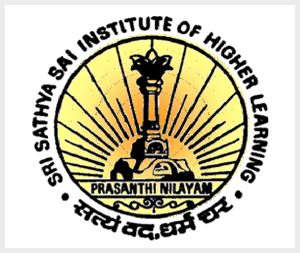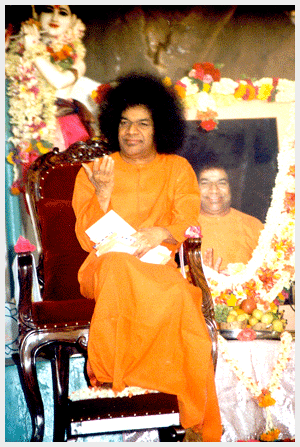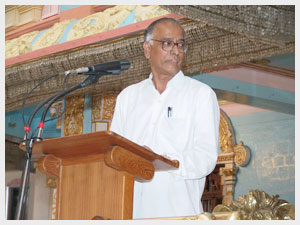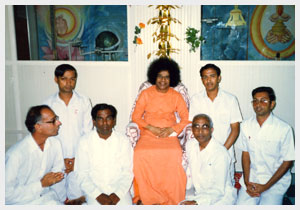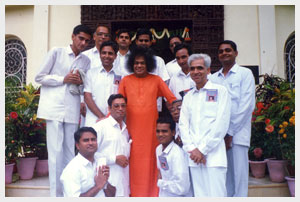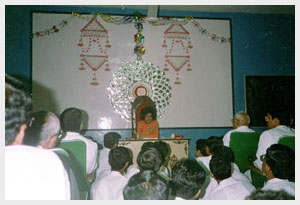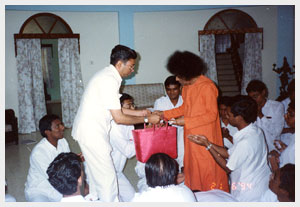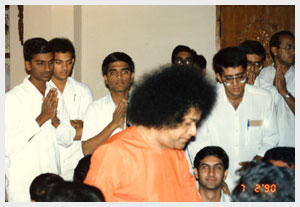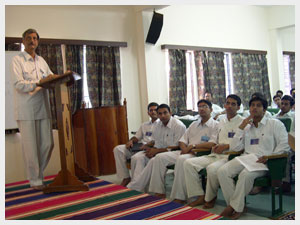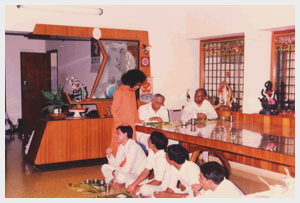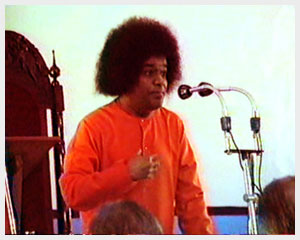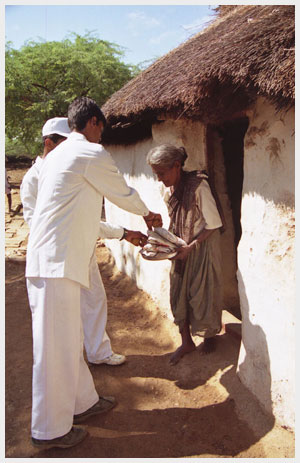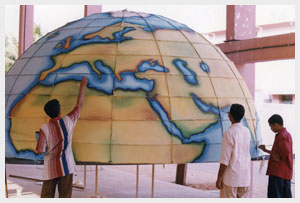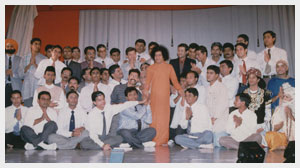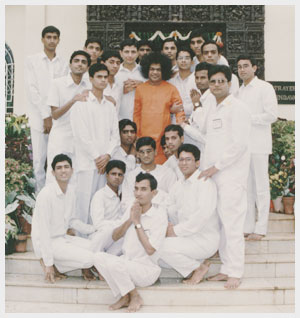 |
 |
 |
| Volume
3 - Issue 8 AUG 2005 |
|
Uniqueness of the MBA programme
|
Genesis Of The Management programme For the commerce students graduating that year, it was a dream, a timely divine boon. As the Institute administration commenced informal consultations with a few faculty members of the then Department of Commerce concerning the course structure, Swami sent Prof. Nanjundaiah, the Controller of Examinations who is a distinguished professor of commerce, to the Administrative Staff College of India, in Hyderabad . He was to meet Prof. Dharani Sinha, the principal and an academic luminary and a man of values and experience, and take his guidance to frame the curriculum for the MBA programme in consultation with the expert faculty in the Administrative Staff College . Prof. Dharani Sinha proposed a draft curriculum. In the meantime, Swami left to Brindavan. And in the words of Prof. Nanjundaiah,
And as directed, Prof. Nanjundaiah right away went to Brindavan and Swami spent a lot of time asking him questions about his meeting with Prof. Dharani Sinha and the outcome thereof. And eventually, a draft programme structure was framed which formed the basis for discussion with an expert committee. The committee consisted of distinguished personalities from industry and commerce including Prof. Dharani Sinha. However it did not take concrete shape even till the time the students went home for the summer vacation. And nobody knew if the course would go ahead for the next academic year 1986-87. However the ways of God are mysterious. Swami resolved that the course should start in the next ensuing academic year itself. And in the words of Prof. Kumar Bhaskar, who has been associated with the programme since inception,
Prof. R. K. Sehgal (who was till then serving in the Steel Authority of India Ltd.’s Staff Training College as the assistant principal) was appointed as the first Dean of the Faculty of Business Management, besides two full time faculty. Three faculty members from the erstwhile Department of Commerce and Mathematics were used as adjunct faculty and the management school finally came into being.
|
Inauguration of the Management School
Swami wanted managers, nay leaders, from this school who would not only set an example of strong character but also influence the nation’s industry and commerce, and provide a value orientation to all business activity. This sacred purpose is conveyed in no ambiguous terms in the programme’s mission -
The Early Years Of The School And Swami’s involvement did not stop at just framing the course curriculum. Like a mother who spends twenty four hours caring and nursing a new born child, Swami spent all His energy and time with the students and professors. What a great opportunity it was! In the words of Parthish Dubey , an alumnus now in UK , “In those days, admission into the MBA programme truly was a Visa to Divine Proximity.” The current Dean of the Management School , Prof. U S Rao, speaking in the divine presence on the MBA Anniversary Day in 2004 recalled the halcyon days of the management programme saying,
|
The Management Programme Evolves... The Ph.D programme at the department is also a decade old now. And the school has produced research work in topics ranging from International Finance and Corporate Strategy to Leadership and Value-based Management which have been widely acclaimed.
Distinguished Visiting Faculty By divine design, the school has also been graced over the years with very distinguished visiting professors, both from India and abroad. Prof. Anantharaman, who is currently a faculty member, is also an adjunct professor in several business schools including the Harvard Business School and Prof. Peter Pruzan, from Copenhagen Business School, Denmark are just a couple of recent examples from overseas. Prof. Chakraborthy and Prof. Srinivas Prakhya from the Indian Institute of Management, Lucknow and IIM, Bangalore respectively are eminent professors from India. And these management gurus not only share their global perspective with the students but also inspire the young minds with their dedication and love for Bhagavan. ‘Man Management’ - The Central Focus Of The programme Dayasindhu, an alumnus currently in Bangalore, gives an inspiring anecdote which proves this point –
‘Man Management’ is not just getting work done through others as one would normally understand. When Praveen joined the programme, he also thought so but having completed the course and now working in Hyderabad, has a wholly different view -
This is the kind of awareness that Swami brings about in every student. Each student is a wholly different person when he steps out of the Institute after the stipulated two years. With His complete involvement with the programme, Swami slowly but surely opens the hearts of the boys to dimensions of life which others seldom attempt. The Heart and Head, both are important, Swami says and moulds each student into an integrated personality one who is an inspiration for others. Narasimhan Venkataraman, who passed out just two years ago and now in Chennai provides testimony to this.
|
Project Work - An Integral Part Of The Curriculum Shirish Patil, an alumnus from Mumbai, goes down the memory lane and shares how Bhagavan was his invisible guide –
Every student has his own story. Swami’s guiding hand was always there whether the student realized it or not. Santhosh Pai, another alumnus from Mumbai, recollects how Swami came to His rescue:
Industrial Visits - A Vital Part Of The programme In 1990, when the boys went to Chennai to visit industries, Swami also altered His own programme to be in Chennai during that time to see that the boys’ visits go on smoothly and the learning process is complete. Many eminent personalities who came for Swami’s darshan there also shared their knowledge and experience with the ‘prospective managers’ in the divine presence. Even now, every year Swami enquires with the boys at the end of each day of the factory visit, the companies they visited, the things that impressed them and the learning that happened. Workshops – An Enlightening Experience
Every management student gets to participate in at least two management workshops during the two year course as the school conducts one every year on a topic which is very current and relevant to the times. In 2005, for example, the Workshop was on “Service Sector in India – Building World-Class Organisations” and on “Leadership and Management of Change” in 2004. And every year, the students have the privilege to listen to luminaries in industry and commerce like Sri Y V Reddy (Governor, Reserve Bank of India) , Sri Vijay Kelkar (Former Executive Director – IMF, and former Finance Secretary, Govt. of India), Sri Venu Srinivasan (Chairman, TVS Motors), Sri Shyamal Gupta (Tata Sons Board Member), Mr. Rajan Govindan (Ex-MD Bankers’ Trust , USA ) and the like. It is a very educative and revealing experience for every student when they interact with people about whom they have only read in business journals and magazines. Divine Lessons In Kodaikanal
Gunaranjan, narrates -
|
Interviews - Another Teaching Avenue For The Lord
The Distinctive Traits Of A SBMAF Alumnus:
Attitude Our attitude decides our altitude, is a famous saying. If in one word we have to describe the secret of Sai management students’ success, it is the attitude. And the whole educational system (which includes the College, the Hostel and sessions with Swami in the Mandir) is geared to cultivate this right attitude in every student. As Ravi Chand, a former student says -
Sensitivity Service to fellowmen has to be the cornerstone for every business activity, Swami has explained to the boys many times. One day on the mandir portico during darshan, Swami asked one student, “What is your next exam?” The boy said, “Swami, it is Marketing”. Swami then asked, “What is Marketing?” The boy answered as per the textbook, but Swami was not convinced with the answer. Swami finally said, “Marketing is producing goods required by the society”.
Every year in the month of October, all the students of the Institute participate in ‘Grama Seva’ wherein they go to the interior villages around Puttaparthi, knock at each and every door and distribute food, clothes and other items of daily use. Apart from giving them a first-hand experience of the joy of serving, it also sensitizes them to the suffering of their fellow brethren. This attitude of serving, of being patient and empathetic to the other person’s views and problems is a priceless boon from Bhagavan and as one student from Mumbai confirms -
Unselfishness and Teamwork
|
The MBA Drama Every year, it would be very special as Swami would visit the Institute Auditorium during the rehearsal of the play and spend a lot of time suggesting changes, inspiring the actors and enlivening the whole team. The MBA Day was always a very extraordinary day even before the tradition of staging a play started in 1991. There was some event or the other, one year it was an exhibition, another year it was an enthralling music programme and so on. Last year (2004), in a departure from tradition, the function was held in Sai Kulwant Hall (rather than the Institute Auditorium) to the joy of every devotee. And Swami made the day even more wonderful. He rose to speak at the end of the cultural programme to the pleasant surprise of everybody assembled and enthralled every student when He said,
Reconnect – The Upcoming Grand MBA Alumni Meet
It will be an occasion for them to express their collective gratitude to Bhagavan for they owe their success entirely to Him for He has made them what they are today. It will be an occasion when they will reaffirm their devotion to Swami and reinforce their faith in the role of values in their professional and personal life. It will be an occasion when they will share their experiences with their junior brothers currently in the Institute and counsel them on how they can make a mark for themselves when they go out into the wide world, away from the comfort of the hostel, the college and above all, the physical proximity of their dearest mother Sai. It will be an occasion when they will discuss each area of management and give feed-back to the faculty and suggest ideas to gear the management programme to face modern day challenges. It will be an occasion when they will relive their glorious days at the Institute and be nostalgic. It will be an occasion to 'Reconnect' with the Lord’s Love and His loving care and bask in His immediate physical presence. A couple of years back, on Valentine's Day, students had prepared a beautiful card for Swami and when Swami came for darshan that day, Vivekananda Sahoo, an alumnus from Noida, who was there holding the card, describes that memorable evening thus:
He came walking down the lanes of our heart, gentle breeze playing with beautiful tresses, a bewitching smile hovering on His lips, joy twinkling in His eyes. Even nature wanted to celebrate this occasion of union with a beloved one, the moisture laden clouds burst forth in all glory. His words were as cool and soothing to the soul as the breeze caressing us.
It is to relive such moments and bask in His love; it is rediscover this relationship in a new light; it is to pay homage to such a loving, most likable Lord. This is the unstated primary purpose of the alumni meet. Can any university in the world dream of such a management programme where along with Total Quality Management - TQM, you also learn the triple qualities of Patience, Purity and Perseverance; where while you learn reengineering techniques in the classes, your whole personality is reengineered, slowly but surely, to face any challenge in life; where individual and fundamental discrimination is as important as analytical tools of management for managerial decision-making; ..this list can go on, let’s come to the most wonderful and most profound aspect, where will you find the Lord Himself, the Divine Manager of the Universe as your personal Guru and Guide! - H2H Team We would like to thank the following individuals whose contribution 1. Prof. Nanjundaiah, Controller of Examinations, SSSIHL.
|
| Optimized for Netscape and Firefox. Best viewed in Internet Explorer - 1024 x 768 resolution. |
